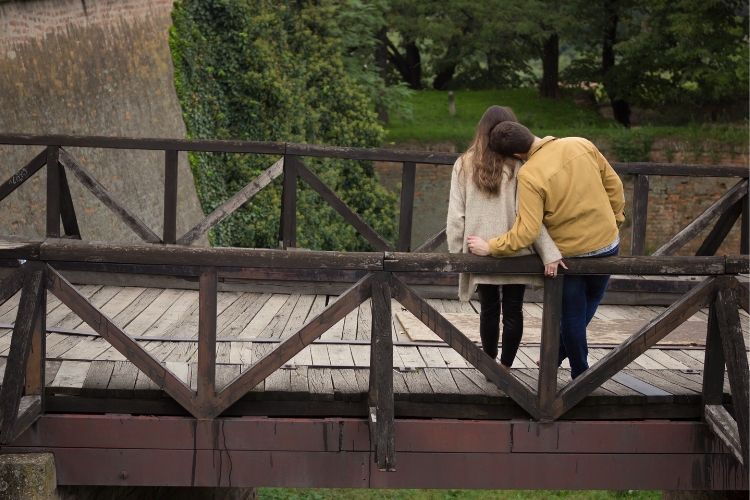Dating in one’s late 20s can be a thrilling yet complex journey, filled with personal discovery, professional pursuits, and evolving societal norms. As young adults navigate this transformative decade, they are often faced with a unique set of challenges that can make finding a fulfilling relationship seem daunting.
In this blog post guide, we aim to explore these challenges, from the shrinking dating pool to the impact of social media on romantic expectations, and provide insights into how to approach dating with resilience and self-awareness.
Key Takeaways
- The late 20s dating scene is marked by a smaller pool of potential partners and heightened personal and professional goals, making dating both challenging and rewarding.
- Expanding social networks and overcoming singlehood stigma are essential strategies for improving dating prospects in your late 20s.
- Societal pressures, career ambitions, and the influence of social media can complicate dating, but they can also lead to more self-aware and meaningful connections.
- Modern dating practices, including online platforms and the paradox of choice, require careful navigation to foster genuine communication and avoid misunderstandings.
- Embracing singlehood and focusing on personal growth can enrich one’s late 20s, laying a strong foundation for future relationships when the time is right.
The Reality of the Dating Pool

Understanding the Dynamics of a Shrinking Circle
As individuals progress through their 20s, they often encounter a shrinking circle of social connections. This phenomenon can be attributed to various factors, including career focus, relocation, and the natural drifting apart that occurs as life paths diverge.
The challenge of meeting new people becomes increasingly apparent as traditional social structures, such as school and university networks, dissolve.
- Declining social capital leads to smaller social circles.
- Safety concerns for women when dating strangers.
- Men face challenges due to the importance of physical attraction.
The dynamics of a shrinking social circle necessitate a proactive approach to expanding one’s network. Embracing new social opportunities and being open to different ways of meeting people, such as online platforms or community events, can mitigate the effects of this social contraction.
Ultimately, understanding and adapting to the changing landscape of social connections is crucial for those seeking romantic relationships in their 20s. The reliance on online dating and social venues underscores the need for safe and authentic spaces where individuals can connect.
Strategies for Expanding Your Social Network
In the quest to find a romantic partner, expanding your social network is a pivotal step. Reframing your perspective on dating can lead to a more positive and less stressful experience. It’s essential to be open-minded and embrace new experiences, which can significantly increase your chances of meeting someone special.
- Join clubs, groups, or organizations: Participating in activities that interest you can connect you with like-minded individuals.
- Leverage social media and dating apps: Use these platforms wisely to connect with potential partners.
- Host or attend social events: Whether it’s a game night or a solo salon, these gatherings can turn acquaintances into valuable connections.
By focusing on self-discovery and personal growth, you not only become more attractive to others but also improve your own quality of life.
Remember, the goal is not just to meet more people, but to meet the right people who share your interests and values. This approach can lead to more meaningful and lasting relationships.
Overcoming the Stigma of Singlehood in Your Late 20s

The late 20s are often painted with the expectation of settling down, yet many find themselves navigating the complexities of singlehood.
Embracing your solo journey can be both empowering and enriching, offering a chance to focus on personal growth and self-discovery. It’s essential to remember that being single is not a predicament but an opportunity to invest in oneself.
Stigma surrounding singlehood can be pervasive, but it’s important to challenge these societal narratives. Here are some practical ways to overcome this stigma:
- Recognize the value of independence and the freedom it grants you to pursue your goals.
- Cultivate a supportive network of friends and family who respect your life choices.
- Engage in activities that bring you joy and fulfillment, whether they’re related to career, hobbies, or personal interests.
While the journey may be solo, it is far from lonely. The late 20s offer a unique chance to build a life that truly reflects your values and aspirations.
Ultimately, the goal is not to rush into a relationship to meet external expectations, but to find contentment in your current state. When the time is right, and you’re ready, the relationships you form will be all the richer for the self-awareness and confidence you’ve cultivated.
Societal Pressures and Personal Aspirations

Balancing Career Ambitions with Romantic Pursuits
In the pursuit of professional excellence, many individuals in their 20s find themselves at a crossroads, having to balance their career ambitions with their desire for romantic relationships. The challenge lies in allocating time and energy effectively to nurture both aspects of life without compromising one for the other.
- Recognize the importance of setting clear priorities.
- Schedule time for dating just as you would for a work meeting.
- Be open about your ambitions and seek a partner who supports them.
The heightened focus on career and personal goals often means that dating takes a backseat. Yet, it’s crucial to remember that personal fulfillment extends beyond the professional sphere.
Ultimately, finding a harmonious balance is key. It involves honest communication about your goals and expectations, and the willingness to make compromises when necessary. By doing so, you can maximize happiness in life, aligning with the notion of investing in what you truly want for a work-life balance.
Dealing with Societal Expectations of Relationships
As individuals navigate their late 20s, the pressure to meet societal expectations becomes increasingly palpable. The traditional narrative of marrying and starting a family early has shifted, allowing more space for personal and professional growth. However, this freedom comes with its own set of challenges.
The societal norms and expectations that evolve as one approaches their late 20s significantly influence the dating landscape. It’s not just about finding someone; it’s about finding the right time and the right person, in a world where the milestones of adulthood are constantly being redefined.
The emergence of new dating practices, such as online dating and hookup culture, adds complexity to the search for a meaningful connection. Here are some of the pressures faced by those dating in their late 20s:
- The expectation to have achieved certain personal and professional milestones before starting a relationship.
- The pressure to settle down and start a family, which can create stress and strain in relationships.
- The challenge of finding compatible partners who share similar interests, values, and goals.
In essence, the late 20s bring about a confluence of societal pressures and personal aspirations that can make dating not just challenging, but sometimes overwhelming.
The Impact of Social Media on Dating Perceptions

The advent of social media has significantly altered the landscape of dating, particularly in how we perceive and engage with potential partners. Social media has altered the power dynamics within relationships, with aspects like online popularity and influence playing a role.
Partners may experience pressure to present a curated version of their lives, often leading to a skewed perception of reality. Online dating has become a popular way for people to meet, but it comes with its own set of challenges.
The pressure to present oneself in a certain way, the temptation to compare oneself to others, and the potential for deception are all heightened in the digital realm. Here are a few dos and don’ts when using social media to navigate the dating world:
- Do remember that profiles only show a fraction of a person’s true self.
- Don’t assume online chemistry will always translate to real-life connections.
- Do use social media to explore common interests.
- Don’t let the number of likes or followers dictate your self-worth or the value of a potential partner.
The real process of building a meaningful connection happens offline, where the nuances of personality and the depth of emotional bonds can truly flourish.
Modern Dating Practices and Challenges

Navigating Online Dating and Apps
In the ever-evolving landscape of modern love, online dating apps have become a staple for many young adults. The allure of a seemingly endless pool of potential partners can be both exciting and overwhelming.
The convenience of swiping through profiles at any time and place has revolutionized the dating scene, but it’s not without its pitfalls. Using apps often morphs into an activity in its own right, becoming less a way of meeting people and more a source of attention, validation, and sexual intrigue.
The key to success in online dating is to approach it with intention and self-awareness. It’s crucial to remember that the personas presented online are often curated highlights of someone’s life, not the full picture.
Here are some tips to navigate the world of dating apps effectively:
- Set clear goals for what you’re looking for.
- Be honest in your profile to attract compatible matches.
- Prioritize safety by meeting in public places and informing a friend about your plans.
- Trust your instincts and don’t hesitate to step back if something feels off.
Remember, the real process of building a meaningful connection happens offline. It’s essential to transition from digital conversations to in-person interactions where you can truly get to know someone beyond their profile.
The Paradox of Choice in Finding a Partner
The abundance of options in modern dating can lead to a phenomenon known as the paradox of choice. Having too many potential partners to choose from can make it surprisingly difficult to make a decision.
This is particularly true in online dating, where the next match could always seem just a swipe away. The illusion of an endless supply of better options can lead to perpetual searching, and ultimately, to choice paralysis.
- The gender imbalance in dating spaces contributes to this paradox, with some individuals feeling overwhelmed by options.
- A heightened sense of selectiveness in one’s late 20s, due to past experiences, narrows the pool of desirable partners.
- The pressure to find a perfect match can lead to a cycle of brief encounters, rather than fostering deeper connections.
In the quest for the ideal partner, many end up in a state of indecision, caught between the allure of the unknown and the comfort of the familiar. This can result in a dating landscape where commitment becomes the exception, rather than the norm.
Communication and Misunderstandings in Digital Romance

In the realm of digital romance, communication is both a tool and a barrier. The ease of messaging can lead to rapid connections, but the lack of non-verbal cues often results in misunderstandings. Here are some common pitfalls to avoid:
- Assuming tone and intent without clarification
- Overanalyzing short messages or response times
- Neglecting to define relationship expectations early on
To navigate these challenges, it’s essential to be clear and intentional with your words. Remember, a message’s brevity doesn’t always signify a lack of interest. Sometimes, it’s just a busy day.
In the dance of digital dialogue, patience and openness are your best steps forward. Misinterpretations are common, but they don’t have to derail a budding romance.
Finally, it’s important to recognize when digital communication is hindering rather than helping. If you find yourself in a cycle of confusion, suggest a phone call or meeting in person. It’s remarkable how a human voice or a shared laugh can cut through the digital fog and reveal the potential for a true connection.
Building Meaningful Connections

The Importance of Self-awareness in Dating
In the quest for companionship, self-awareness stands as a beacon, guiding individuals through the complexities of the dating world.
Recognizing and understanding one’s own emotions, thoughts, and behaviors is not just a journey of personal enlightenment but a strategic approach to finding a partner who resonates with your true self.
For instance, acknowledging one’s fear of vulnerability can be the first step towards building the confidence necessary to attract a partner who values and respects you.
Self-awareness in dating is about being honest with oneself about goals, expectations, and the balance between personal and professional life. It paves the way for more positive and fulfilling connections.
To cultivate this awareness, consider the following steps:
- Reframe your perspective on dating to reduce stress and pressure.
- Prioritize self-discovery and personal growth to build confidence.
- Be open-minded to new experiences and diverse relationships.
- Reflect on past relationships to identify and improve patterns.
- Prioritize communication for stronger connections.
- Seek support from friends and family for emotional encouragement.
Remember, the image presented on dating apps and social media is often a curated highlight reel, not an accurate representation of someone’s character. True connection builds through direct interaction and shared experiences.
Creating Lasting Relationships Amidst Uncertainty
In the quest for lasting love, the role of vulnerability and authenticity cannot be overstated. Allowing ourselves to be vulnerable opens the door to genuine intimacy and connection.
It’s through this openness that we can show our true selves, with all our fears and desires, fostering trust and deepening emotional bonds. This foundation is crucial for enduring relationships.
Flexibility and adaptability are also vital in today’s ever-changing world. Couples who navigate life’s challenges together, adapting to new situations, often find their bonds strengthened. Embracing change isn’t just necessary; it’s an opportunity for growth and deeper connection.
- Understand the importance of vulnerability
- Embrace authenticity to foster trust
- Cultivate flexibility and adaptability
- View change as a growth opportunity
The journey to finding lasting love is filled with a variety of partners and relationship styles. Exploring these avenues isn’t just about meeting new people; it’s about discovering what truly resonates with us and what doesn’t. This exploration is key to understanding ourselves and what we seek in a partner.
The Role of Shared Values and Interests

In the quest for a lasting relationship, the significance of shared values and interests cannot be overstated. Common ground in core beliefs and hobbies acts as a strong foundation, fostering a deeper connection beyond superficial attraction.
For instance, two individuals who prioritize family, honesty, and adventure will likely find more harmony in their journey together. Vulnerability and authenticity are also pivotal in nurturing a meaningful bond. When partners are open about their fears and aspirations, they create a space for trust and understanding.
This emotional bravery paves the way for a resilient partnership that can weather the storms of life.
- Effective communication skills
- Active listening and empathy
- Assertiveness and respect
These are the tools that help couples navigate the complexities of a relationship, ensuring that both parties feel heard and valued. It’s through these practices that misunderstandings are minimized and conflicts are resolved constructively.
Embracing shared values and interests, coupled with a commitment to open communication, sets the stage for a relationship that is not only enduring but also enriching for both individuals involved.
Embracing Singlehood and Personal Growth

The Benefits of Being Single in Your Late 20s
The late 20s are often depicted as a time when societal norms and personal expectations converge, creating a perceived urgency to find a romantic partner. However, there are undeniable advantages to being single during this transformative decade.
Embracing singlehood can lead to profound personal growth and a deeper understanding of one’s own needs and desires. Freedom is one of the most celebrated aspects of single life in your 20s.
Without the commitments that often come with a relationship, you have the opportunity to explore, take risks, and focus on personal aspirations. Here are some reasons to celebrate being single:
- Personal development: Time to invest in yourself, your career, and your passions.
- Flexibility: The ability to travel, relocate, or change careers without compromise.
- Self-discovery: Learning what truly makes you happy, outside of a relationship context.
- Financial independence: Managing your finances without the complexity of a partnership.
There is absolutely no joy in settling down before you are ready. You should absolutely not compromise your standards, dreams, or desires because of an ‘age’.
While the journey of self-exploration and independence can be liberating, it’s important to recognize that this path is not devoid of challenges. The key is to navigate these years with intention and an open heart, knowing that the experiences gained will lay the groundwork for future relationships—whenever they may come.
Personal Development as a Foundation for Future Relationships
The journey of personal development is a cornerstone for establishing future relationships that are both healthy and fulfilling. Self-awareness is the bedrock of this journey, allowing individuals to understand their own needs, desires, and the patterns that govern their interactions with partners.
Recognizing one’s strengths and weaknesses not only aids in finding a compatible partner but also fosters a relationship grounded in mutual respect and understanding.
Reflecting on past experiences is a crucial step in personal growth. It enables one to identify and learn from previous patterns, thereby improving future dating experiences. Here are some key points to consider in this reflective process:
- Understanding the impact of relationships on personal growth
- Identifying recurring behaviors in past relationships
- Recognizing the role of self-esteem and vulnerability
- Prioritizing communication to strengthen connections
Embracing personal growth does not mean putting love on hold indefinitely. It’s about preparing oneself to engage in relationships with a clear sense of identity and purpose.
The support of friends and family is invaluable, providing emotional backing and encouragement as one navigates the complexities of dating. Ultimately, personal development is an ongoing process that not only enhances one’s own life but also sets the stage for more authentic and meaningful partnerships.
Knowing When to Seek Love and When to Focus on Self

The late 20s can be a pivotal time for personal growth and self-discovery, often making it challenging to determine when to seek love and when to prioritize oneself. Self-awareness is crucial; it’s the compass that guides us through the complexities of relationships and personal aspirations.
For instance, recognizing one’s own patterns in relationships can lead to healthier choices and more fulfilling connections.
The journey of self-discovery is not just about finding a partner who complements you, but also about becoming someone who is whole and content on their own.
Understanding that love can develop under the right circumstances, with mutual respect and ease, can alleviate the pressure to find the ‘perfect’ person. Instead, it’s about nurturing a connection that has the potential to grow into the deep love you desire.
- Reasons to Focus on Self:
- Exploring personal interests and values
- Achieving professional goals
- Cultivating self-love and confidence
- Reasons to Seek Love:
- Desire for companionship and connection
- Finding someone with shared values and interests
- Building a life together with mutual respect and support
Conclusion: Embracing the Journey of Dating in Your Late 20s
In summary, dating in your late 20s is undeniably complex, marked by a confluence of societal shifts, personal ambitions, and a more selective dating pool. While these factors can make the search for a romantic partner daunting, they also offer a chance for profound self-discovery and growth.
Embracing the challenges with openness and self-awareness can lead to meaningful connections and fulfilling relationships. Remember, the path to love is rarely straightforward, but it is the twists and turns that make the journey worthwhile.
Whether you choose to dive into the dating scene or take a step back to focus on self-growth, your 20s are a time of exploration and personal evolution. So, navigate this decade with confidence, knowing that each experience, whether solo or shared, is a valuable chapter in your life’s story.
FAQs:
Is dating in your late 20s really as challenging as it seems?
Yes, dating in your late 20s can be challenging due to shifting societal norms, a smaller pool of eligible partners, and a focus on personal and professional goals. However, it is still possible to navigate these challenges and find meaningful relationships.
What are some common challenges faced when dating in your late 20s?
Common challenges include dealing with societal pressure to settle down, finding compatible partners as social circles shrink, balancing dating with career ambitions, and navigating the complexities of online dating and social media influences.
How can I expand my social network to meet potential partners?
You can expand your social network by joining clubs, groups, or organizations that align with your interests, attending social events, trying new activities, and being open to meeting people through various channels, including online platforms.
How does social media impact dating perceptions in your late 20s?
Social media can create unrealistic expectations for relationships and contribute to the pressure of finding the ‘perfect’ partner. It can also lead to comparisons and a sense of missing out, which can affect dating attitudes and self-esteem.
What role do shared values and interests play in building meaningful connections?
Shared values and interests are crucial for building meaningful connections as they provide a foundation for mutual understanding, respect, and long-term compatibility. They help in creating deeper bonds and more fulfilling relationships.
Should I focus on dating or personal growth in my late 20s?
It’s important to strike a balance between dating and personal growth. While seeking meaningful relationships, also invest in your personal development, which can ultimately create a stronger foundation for future relationships.

